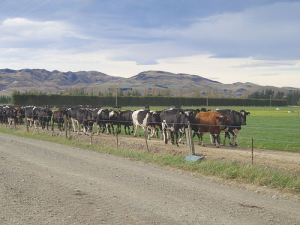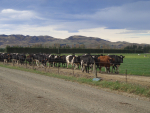According to the DairyNZ’s lameness cost calculator, lameness costs over $500 per lame cow – due to lost production, having to withhold milk from treated animals or reproductive problems.
While we cannot completely eradicate lameness, early detection and prompt effective treatment can greatly reduce its impact on the health of our herds and the profitability of our businesses.
Lameness is a symptom of pain, but by the time a cow has become lame enough to show us, or drop to the back of the mob and change her behaviour, meaning her activity and rumination has dropped off, her dry matter intake has already reduced significantly. This results in reduced energy availability for reproductive performance, milk production and self-preservation.
OmniEye, a New Zealandbased company, has developed a non-obtrusive, non-wearable livestock monitoring system which utilises cameras combined with artificial intelligence and machine learning. This innovative technology allows farmers to monitor the health and welfare of their herds and detect lameness at an earlier stage. OmniEye monitors the herd as they leave the shed, in their usual position in the pecking order, capturing their natural gait without any attempt to conceal discomfort.
Sean Ginders of Medstone Dairy emphasises the system’s effectiveness: “OmniEye spots lame cows early, while they’re still in the middle of the mob so we can do something about it before they become a problem and drop to the back.”
By leveraging OmniEye’s intelligent technology, dairy farmers can gain crucial insights into the health of their herd, detect lameness early, and take proactive measures to mitigate its impact. Geoff Colson from Riverstone, has already experienced the benefits of this system.
“I’m spending more time at the computer, but it is valuable time because this system is spotting lame cows.”
Visit site PD15



















